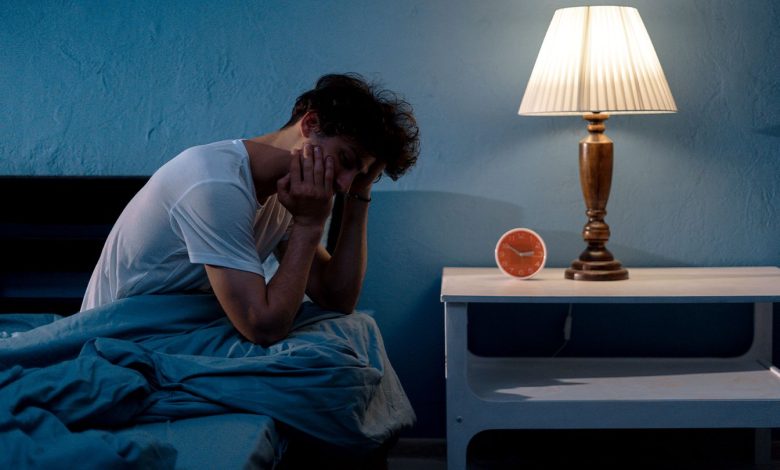Skin Diseases Like Atopic Dermatitis Can Cause Profound Sleep Issues

[ad_1]
For people with skin diseases such as atopic dermatitis (eczema), psoriasis, and acne, symptoms such as itchiness and tenderness can make a good night’s rest elusive. And things go downhill from there.
A large new study based on surveys with skin disease patients in 20 countries discovered that more than 40 percent cope with sleep disturbances that often have a profound impact on their physical functioning and work performance.
Presented on October 13 at the European Academy of Dermatology and Venereology (EADV) Congress 2023, the yet-to-be-published research found that more than 7,000 of the 17,000-plus respondents (about 42 percent) reported sleep difficulties due to their skin condition, according to a press release.
“Nearly half of the patients with skin diseases suffered from sleep disturbances due mainly to itching in 60 percent of cases and burning or tingling sensations in 17 percent of cases,” says lead author Charles Taieb, MD, research director of European Market Maintenance Assessment (a private company that implements patient-oriented projects).
He adds, “The study showed that these sleep problems had a wider impact on patients’ quality of life. In fact, almost half [49 percent] of patients with skin disease reported a drop in productivity at work due to sleep issues.”
Poor Sleep Means Coping With Fatigue During the Day
Dr. Taieb and his team also noted that more than 8 in 10 respondents experienced periods of drowsiness during the day. The same number indicated having a feeling of fatigue as soon as they woke up. About 7 in 10 reported repeated yawning, and 58 percent said they had tingling sensations in the eyes. Almost three-quarters had a decrease in concentration.
These signs of sleep disturbance were all greater in people with skin disease compared with a study population of nearly 33,000 who did not have a skin disease. Under 20 percent in the nondisease group reported reduced productivity at work due to sleep troubles. All other indicators of insufficient sleep and fatigue were 10 to 20 percent less frequently experienced in the nondisease group.
“The results suggest that we may be underestimating the potential impact on people’s quality of life from some of these skin conditions,” says Albert Chiou, MD, associate professor of dermatology at Stanford Health Care in California, who was not involved in the research. “Clearly, symptoms are spilling over into their sleep and contributing to a high degree of sleep disturbance.”
Participants had an average age of close to 40 with more than 42 percent male and over 57 percent female. They were surveyed as part of the ALL project, a large-scale effort aimed at collecting data on skin diseases and skin types on a global scale.
Most survey respondents (7,524) had acne, followed by 4,874 with atopic dermatitis–eczema, and 2,237 with psoriasis. Just over 1,700 had chronic hand eczema and 937 had rosacea, with the remainder having other skin diseases.
Stress Worsens Symptoms, Which Then Worsen Stress
Itchiness in particular has been a recognized driver of sleep disturbance, especially for those with atopic dermatitis, according to Anthony Rossi, MD, a dermatologist affiliated with Memorial Sloan Kettering Cancer Center in New York City who did not contribute to the new study.
“Children and adults who have itch from skin disease often say that they wake scratching or are not able to have restful sleep,” says Dr. Rossi.
He suggests that the lack of sleep can exacerbate stress, which in turn can then worsen symptoms, and lead to more scratching at night.
Treatments Can Help Break the Vicious Cycle
Addressing the underlying condition can help break the cycle. Dr. Chiou stresses the importance of working with a dermatologist to get effective treatments that will suppress the disease itself and reduce or eliminate symptoms.
Chiou was involved with research evaluating the effect of using the atopic dermatitis medication dupilumab (Dupixent) on sleep in 188 patients. The study, published in August 2023 in the British Journal of Dermatology, found that patients’ self-reported sleep quality significantly improved in the medication group compared with those treated with placebo, and this tracked with the improvement in the underlying skin condition.
“I think this is just one example of how potentially controlling an underlying, symptomatic skin condition can directly improve the negative impact of the skin condition on sleep,” says Chiou.
Good Sleep Habits Can Also Help
Paying more attention to sleep habits may also make a difference in helping people with skin conditions improve their health and their daily lives.
“One can create better sleep hygiene in general by setting times to go to bed,” says Rossi. “Also, creating a very restful and serene environment devoid of stimuli or electronics will allow for a better night’s sleep.”
For the study researchers, the findings underscore the critical need for early detection and effective management of sleep disturbances. They say that moving forward, healthcare providers should be encouraged to regularly check in with their patients about sleep issues.
[ad_2]




